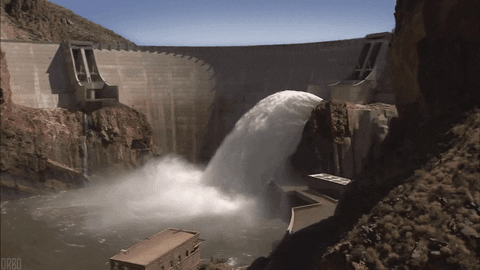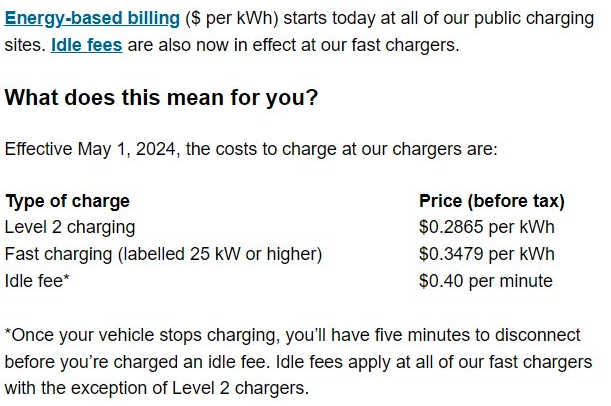
3 Ways to Bill for EV Charging - BC Hydro
Time Based, Energy Based or Hybrid Pricing?
BUSINESSES


How can I bill my customers for using my chargers?
There are 3 main ways of billing customers for using your EV chargers - time based, energy based and hybrid pricing. Each method is best suited for specific situations. It looks like the market is trending towards energy-based billing, and we'll reference BC Hydro as they just made this switch as well.
Introduction
Today, we'll be examining the various methods of charging customers for the use of EV chargers. BC Hydro has just released their new rates for using their public chargers, so I thought this would be good timing. We'll use them as an example to discuss the shifting market trends and the pros and cons of each option.
Overview of Public Charging Billing Options:
Time-Based – based on how long the charging session lasts.
Energy-Based – based on how much electricity is consumed during a charging session.
Hybrid Pricing – a combination of time and energy based.
BC Hydro - New Rate Structure
In April 2024, BC Hydro announced that a new pricing structure has been approved. Starting from May 1st, drivers will be charged based on the amount of energy consumed by their car, rather than the time it is plugged into the charging station. This change levels the playing field for drivers with EV’s that charge slower than typically more expensive, faster-charging cars. Drivers will now pay 0.35 cents per kilowatt for all fast chargers and 0.29 cents per kWh for slower Level 2 EV chargers. The Vancouver Sun goes into more detail.
BC Hydro Idle Fees
As you can see on the image above, there is mention of an Idle Fee. BC Hydro has also implemented an Idle Fee or "Extended Stay Charge" of 0.40 cents per minute on their Level 3 EV Chargers. This is an attempt to encourage drivers to promptly move their cars as soon as they finish charging. People have mixed opinions about the idle fee as you can imagine.
Idle Fee Controversy
The idle fee is a controversial yet necessary aspect of the EV charging system. It depends on which side you're on. If you're the party supplying the EV charger, it's understandable that you wouldn't want people occupying the charging stall long after their car has been fully charged. This can be frustrating for other EV drivers who need to use the chargers, and it also represents an opportunity cost in terms of lost profits from the occupied space not generating any payment.
Strata’s Love Idle Fees
I've worked with many clients, specifically in strata residential buildings, who love the idle fee. They often ask for the highest penalty charge possible, which I find amusing. Their reasoning is that it's a quick learning lesson for residents that don’t follow rules. If they are negligent and choose to leave their car in the EV charging spot long after the car has finished charging, they'll be hit with a significant penalty fee and hopefully will never do it again.
80% Rule
One thing to note before we dive into the charging discussion below is that drivers should only charge an EV’s battery up to 80%. If their car has a 60 kWh battery, then it should stop charging around 48 kWh. The speed of charge becomes dramatically slower once it exceeds 80% because lithium batteries don’t like to be charged to 100%. It damages their longevity.
1. Billing by Time
Time-Based: With this approach, drivers pay based on the duration of charging.
Originally, most EV Chargers were billed with the time-based approach. I believe this is largely because it's a simpler billing model to implement. Electricity supply and energy currents are complicated and more difficult to track. The time-based system kept things simple in the beginning as people understood the concept.
I have two Level 2 Flo chargers in the visitor parking area of my apartment building downstairs. They've been installed since roughly 2018 and cost $3.00 per hour to use. This is a fairly accurate average market price for time-based billing.
Billing by Time Example:
Let's use the Flo Chargers in my building as an example of the time-based model:
A Tesla Model 3 has close to a 60 kWh battery pack. Our Level 2 Flo Chargers' output is 10 kW. If you set the hourly rate at $3.00/hr and the charger outputs 10 kW, it would take about 6 hours to charge the Tesla (ignoring the 80% rule mentioned above).
This means:
60 kWh / 10 kW = 6 hours to fully charge
The driver would have to pay roughly:
6 hours x $3.00 = $18.00
Is this Fair?
What if you have an EV that charges very slowly and has a low peak charging rate? The Nissan Leaf is notorious for slow charging. This EV has a peak charging rate of 52 kW. This means you could plug it into a Level 3 EV Charger with 350 kW of power, but the Leaf will only accept 52 kW.
Charging by time feels unfair for EV drivers with slow-charging cars because they're not paying for the amount of electricity they consume; they're paying for how long they are sitting in the parking stall. Also, the time-based model is much more applicable to Level 2 EV Chargers because they'll be sitting there for a while. It doesn't make as much sense for Level 3 Chargers because they're much faster and charging time is usually less than 45 minutes.
2. Billing by Energy (kW)
Payment per kWh: Here, EV owners are billed for the exact amount of energy they consume. This is a much fairer method because drivers pay for the amount of energy they consume. Many EV charging companies are shifting towards this model because it makes more sense if executed properly.
To continue with my Flo Chargers example, here is a comparison using the energy-based model:
Let's see how much it costs with the same Tesla Model 3, the same 60 kWh battery pack, and the same Flo Chargers. Our Flo Chargers' output is still 10 kW. If you set the energy rate at 0.29 cents per kilowatt, it would still take 6 hours to charge, but the total cost would now be $17.40 total (rounded up rate for simplicity).
Level 2 Charger - BC Hydro Rate
As noted, if your rate is $0.29 per kWh, a car that uses 60 kWh will cost:
$0.29 x 60 kWh = $17.40
As you can see, billing by energy consumption is usually slightly cheaper for drivers and, in my opinion, much fairer.
Level 3 Charger - BC Hydro Rate
To conclude this example, we can examine the cost of charging our Tesla Model 3 at one of the BC Hydro Level 3 EV Chargers with the new rate of 0.35 cents per kilowatt. The Model 3 can support fast charging up to 250 kW. Using a BC Hydro level 3 charger, the Model 3 could reach full capacity in 15 minutes, costing roughly $21.00.
For Level 3 EV Charging, if the rate is $0.35 per kWh, a car that uses 60 kWh will cost:
$0.35 x 60 kW = $21.00
3. Hybrid Billing
Hybrid System: This strategy, though not very common, combines both time and energy-based billing.
Billing by a combination of time and energy is quite uncommon, but it is seen in various forms. The most common form I've seen is a combination of a kWh rate plus a parking fee. For instance, a university near my workplace requires payment for parking when I leave my car and walk to work. This university also has a row of EV chargers at the entrance of the parking garage. If EV drivers could park and charge their vehicles for free while gasoline-powered vehicles had to pay for parking, it would be quite unfair. To balance this out (and collect more revenue), many parking lots have implemented a hybrid system of paying for electricity consumed as well as paying for parking.
Fixed Rate Billing
I should also mention there is sometimes a fixed-rate billing model, such as being billed on a monthly basis. This is quite uncommon, and I haven't come across it in a public setting.
This usually only works in specific circumstances where a driver is returning to the same charger repeatedly. Sometimes, Stratas use this model and bill residents for using the building's electricity. If an owner would like to have their own exclusive level 2 EV charger in their designated parking stall, then often a flat monthly rate like $40/month will be added to their strata fees. It's a flat rate regardless of how much power is used.
Conclusion
We're seeing a trend towards fairer and more equitable billing models, and BC Hydro is following this shift as well. Energy-based billing systems seem to align with what is best for many EV drivers. As consumers, it's crucial to understand these models and make informed decisions that best suit our needs. As business owners, it's even more important to price our EV chargers effectively to meet market demand and generate a profit. I hope this article provided more clarity on the direction EV charging is headed and gave you valuable insights to make the best decisions moving forward.
Remember, I’m here if you need anything so please give me a shout.
Happy Trails,
Strong Energy












